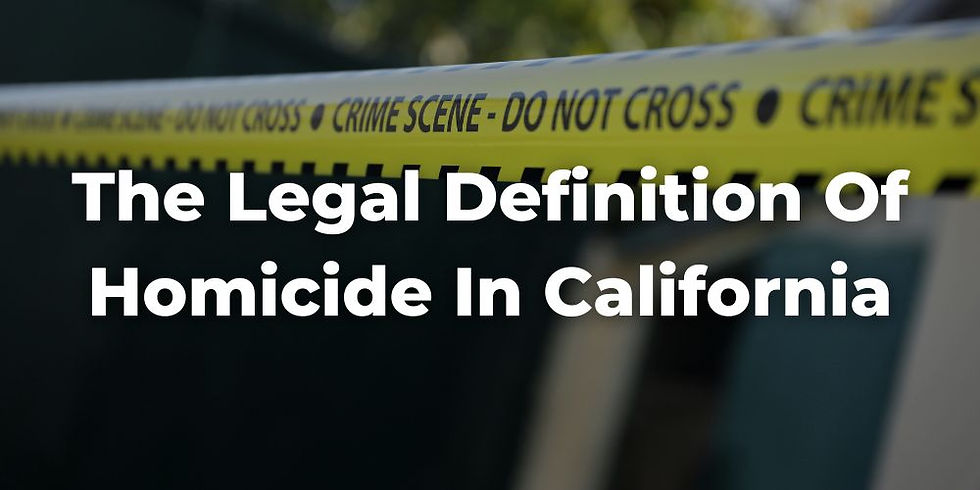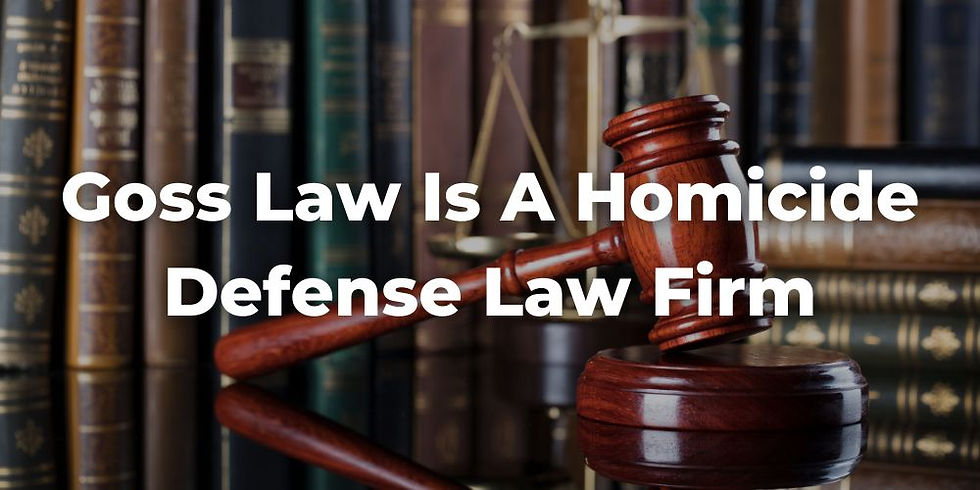What Are the Different Types of Homicide Charges in CA?
- Blair Goss

- Jul 30, 2025
- 5 min read
One of the most serious criminal offenses in California is homicide. This crime has a broad definition; when one person kills another in an unlawful manner, it is homicide. The charges for homicide cases vary greatly, and it all depends on factors like severity, intent, and evidence. Each of the charges also have different penalties. Understanding what the different types of homicide charges are in California is essential for anyone facing these charges.
This guide will outline the main categories, how California homicide laws work, and what consequences are possible. Goss Law can also advise on questions like What is the max sentence for homicide in CA?

The Legal Definition of Homicide in California
California law is based on the California Penal Code. The legal definition of homicide in California per California Penal Code Section § 187 is this: “the unlawful killing of a human being or a fetus with malice aforethought.”
However, not all killings are treated the same in the eyes of the law. Courts and prosecutors will always take the defendant's intent and the circumstances of the situation into consideration. They will also consider any aggravating or mitigating factors.
In general, the following homicide, or murder charges, are recognized in the state:
First-degree murder
Second-degree murder
Voluntary manslaughter
Involuntary manslaughter
Vehicular manslaughter
Each of these charges have specific legal elements that must be proven by the prosecution without a reasonable doubt. If the prosecutor can't prove these things, the case can be dropped or lesser charges may apply.
First-Degree Murder
Of the felony murder charges, first-degree murder is the most serious. To be convicted of first-degree murder it must be proven that the crime was willful, deliberate, and premeditated. In other words, the prosecution must prove that the accused wanted to kill another person, and it was a planned murder. However, there are a few other things that can make a charge a first degree murder including if the death occurred while the accused was in the process of another felony crime like a hate crime, as part of a criminal street gang, when committing robbery, burglary, rape, or arson. This is known as the felony murder rule.
It's also possible that first degree murder charges can be elevated to capital murder if the victim was a person like a police officer, firefighter, elected official, etc. Additionally, capital murder applies if the murder was done for financial gain or if multiple people were killed.
Key Elements:
Intent to kill the victim
Premeditation and deliberation
Use of destructive devices/deadly weapon (e.g., bombs or poison)
Killing during the commission of an enumerated felony
Penalties:
25 years to life in prison
Life without the possibility of parole (LWOP) in special circumstances
Capital punishment (death sentence), although currently under moratorium in California
Second-Degree Murder
Second-degree murder charges are not as serious as first-degree murder in California, but it's still very serious. The difference between first and second-degree felony murder is that there was no planning/deliberate actions. In other words, a person might not mean to kill the other person, but their actions could inflict great bodily injury or death. Examples of this include shooting a gun into a crowd and taking a human life, driving at high rates of speed on a crowded highway and hitting another vehicle, killing the driver, or an assault resulting in death, even if the accused didn't mean to kill the other person.
Key Elements:
Malice (express or implied)
No premeditation or planning
Conduct that is inherently dangerous to others
Penalties:
15 years to life in prison
20 years to life if a firearm was used
25 years to life if the victim was a peace officer, firefighter, EMT, etc.
If the accused has a prior murder conviction, life in prison without the possibility for parole is also on the table
Voluntary Manslaughter
Another type of homicide charge is voluntary manslaughter. This is a charge that is handed down when someone intentionally kills another person, but only does it in the heat of the moment, or in the heat of passion. These are murders that occur during a sudden fight or under circumstances that would allow a reasonable person to become emotionally disturbed. Though this is still homicide, it's not treated in the same way, as the law understands that emotions can affect culpability. The top criminal defense lawyers in Sacramento may also understand this and therefore might advise on how to navigate a voluntary manslaughter charge.
Examples of this include getting into a physical fight with another person that causes a dangerous act to become deadly or the accused discovers their spouse was having an affair, and in a fit of rage, they murder the lover of their spouse.
Key Elements:
Intentional act of killing
Provocation that would overwhelm an ordinary person
No prior planning or deliberation
Penalties:
Voluntary manslaughter carries 3, 6, or 11 years in state prison
Possible sentence enhancements for firearm use or prior convictions
Involuntary Manslaughter
Involuntary manslaughter is considered an unintentional killing that results from criminal negligence or during the process of a non-felony crime. In this case, it does not involve intent to hurt the victim at all. Some refer to these criminal charges as "accidental murder" or "accidental death."
Examples of this is causing a fatal car accident when texting and driving or accidentally discharging a firearm when handling it carelessly.
Key Elements:
No intent to kill
Commission of a lawful act in an unlawful manner or with gross negligence
Death results from the act
Penalties:
Up to 4 years in prison
Possible fines and restitution
Civil liability for wrongful death
Vehicular Manslaughter
Vehicular manslaughter cases occur when someone's death is caused by the negligent or unlawful operation of a vehicle. It can be a misdemeanor or a felony depending on the severity of the negligence. An example of this is when a person is doing the unlawful act of excessive speeding, crashing, and causing a person's death.
Key Elements:
A death caused while driving
Negligence or gross negligence
No intent to kill
Penalties:
Up to 1 year in jail (misdemeanor)
Up to 6 years in prison (felony)
Gross Vehicular Manslaughter While Intoxicated
This is a more severe form of vehicular manslaughter and is charged when a driver, under the influence of drugs or alcohol, causes the death of another person through gross negligence. This is also referred to as DUI murder charges. Prosecutors may elevate the charge to second-degree murder if it can be shown that the defendant had prior knowledge of the risks of DUI.
Key Elements:
Driving under the influence (DUI)
Gross negligence
Resulting death
Penalties:
4, 6, or 10 years in state prison
15 years to life if the driver has prior DUI convictions
Other Considerations in Regard to Homicide Charges
It's also important to keep in mind that some homicides are justifiable or excusable. This means that the person may have killed someone else, but that they had a lawful excuse. An example of this is self defense.
A person can also be be convicted and jailed for attempted murder, even if they are not an actual killer. If it can be proven that the person wanted to produce death or serious injury, but the victim survived, charges can still apply. Goss Law has insight on defenses to homicide in CA.

Goss Law is a Homicide Defense Law Firm
So, what are the different types of homicide charges in CA? They range from first-degree and capital murder, which are the most severe, to involuntary manslaughter, which is the less serious of homicide charges. However, someone did lose their life, and there are consequences.
Goss Law offers experienced legal representation for clients charged with all forms of homicide. With a focus on protecting rights, uncovering facts, and crafting strategic defenses, the firm ensures that every client receives the strongest possible support when facing some of the state's harshest criminal allegations. For a free consultation, call today.

Comments